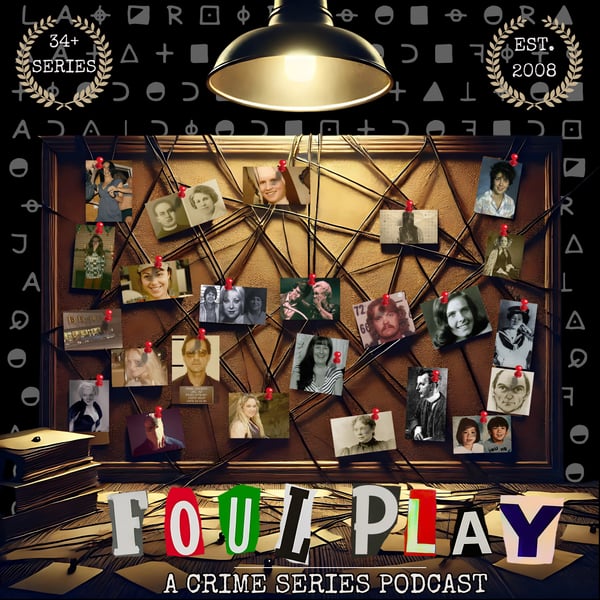S2 Ep68: Sister Cathy, Organized Abuse – A Global Call to Action
Foul Play: Crime Series
Shane L. Waters, Wendy Cee, Gemma Hoskins
4.4 • 986 Ratings
🗓️ 7 April 2020
⏱️ 63 minutes
🧾️ Download transcript
Summary
Salter discusses the paradigm shift in how organized sexual abuse, especially involving individuals who endured such atrocities in childhood, is recognized and approached today. With regret, he reflects on the skepticism that once met such cases and how his association with bodies like the ISSTD, Child Abuse Prevention Service Australia, and the eSafety Office signifies progress in advocacy and support.
The dialogue turns to the defunct False Memory Syndrome Foundation, a body that once vigorously challenged the credibility of recovered memories of childhood abuse. Salter dissects the implications of its dissolution, affirming the scientific consensus around trauma-related amnesia and the authenticity of survivors' recovered memories.
A pointed critique is leveled at Facebook's proposed end-to-end encryption initiative for Messenger, with Salter elucidating the potential dangers such privacy measures could pose to children. He explains the necessity of safeguarding child protection mechanisms, stressing the potential increase in risks of exploitation due to encryption hindering the detection of predatory behavior.
Shane and Gemma steer the conversation towards actionable insights, echoing Salter's call for heightened efforts in victim support, mental health services enhancement, professional training, and stringent regulation of the tech industry to prevent the perpetuation of organized sexual abuse.
This episode is a clarion call for listeners to understand the gravity of these issues and to take part in a collective effort for change. For further engagement and resources, Salter urges a visit to itsfoulplay.com, where the dialogue on safeguarding the vulnerable continues. This session is a testament to the power of informed discourse and the importance of leveraging expertise to fortify our child protection systems against the evolving challenges of the digital age.
Transcript
Click on a timestamp to play from that location
| 0:00.0 | I'm going to Oh, oh, oh, oh, oh, oh, oh, oh, oh, oh, I'm an Associate Professor of Criminology here at the University of New South Wales in |
| 0:37.3 | Sydney, Australia. I've been appointed as a C&T fellow which means basically you're a research |
| 0:42.4 | fellow and most of the time is focused on research. |
| 0:45.2 | It probably the last 15 years or so, most of my works been with adults who describe sexual abuse by groups of offenders in childhood. |
| 0:54.0 | So what I call organized abuse. |
| 0:56.0 | When I started doing this work 15 years ago, it was a very controversial area to work in |
| 1:01.0 | and there was a lot of skepticism, sex offenders who have been |
| 1:04.9 | children operated in networks and groups. That skepticism has disappeared |
| 1:09.8 | over the time I've been doing the work. It's really undeniable now that we need to deal with criminal |
| 1:15.4 | conspiracies of pedophiles. |
| 1:17.1 | Sex offenders? Yeah, so that's mostly what I study. So I do a lot of work on the mental health |
| 1:22.1 | impacts, those sorts of criminal activity that So I do a lot of work on the mental health impacts |
| 1:23.1 | those sorts of criminal activity that organized groups |
| 1:26.4 | get up to and increasingly working, |
| 1:29.0 | also in the tech space looking at current epidemic of online child sexual abuse material and how we can get |
| 1:36.7 | abuse images and videos of kid offline much more efficiently and effectively than we have been. |
| 1:42.4 | Fascinating already. Michael we know that efficiently and we have been |
| 1:49.5 | Fascinating already Michael we know that you're involved with the international society for the study of trauma and |
| 1:51.3 | Disociation and |
| 1:57.0 | We'd really like to hear what your involvement is and how that group came to be. Yeah, great. The ISSTD was formed in the mid 1980s in 1986 and it was fought by clinicians and therapists who were |
| 2:07.8 | encountering severely traumatized children and adults in middle health settings. |
| 2:13.7 | So in 1980, the DSM 3 was published. |
... |
Please login to see the full transcript.
Disclaimer: The podcast and artwork embedded on this page are from Shane L. Waters, Wendy Cee, Gemma Hoskins, and are the property of its owner and not affiliated with or endorsed by Tapesearch.
Generated transcripts are the property of Shane L. Waters, Wendy Cee, Gemma Hoskins and are distributed freely under the Fair Use doctrine. Transcripts generated by Tapesearch are not guaranteed to be accurate.
Copyright © Tapesearch 2025.

